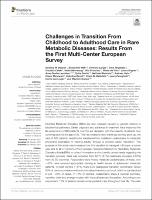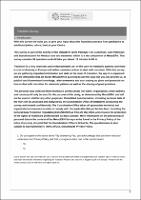| dc.contributor | Vall d'Hebron Barcelona Hospital Campus |
| dc.contributor.author | Stepien, Karolina M. |
| dc.contributor.author | Kieć-Wilk, Beata |
| dc.contributor.author | Lampe, Christina |
| dc.contributor.author | Tangeraas, Trine |
| dc.contributor.author | Cefalo, Graziella |
| dc.contributor.author | Belmatoug, Nadia |
| dc.contributor.author | del Toro Riera, Mireia |
| dc.date.accessioned | 2022-03-14T13:33:18Z |
| dc.date.available | 2022-03-14T13:33:18Z |
| dc.date.issued | 2021-02 |
| dc.identifier.citation | Stepien KM, Kieć-Wilk B, Lampe C, Tangeraas T, Cefalo G, Belmatoug N, et al. Challenges in Transition From Childhood to Adulthood Care in Rare Metabolic Diseases: Results From the First Multi-Center European Survey. Front Med. 2021 Feb;8:652358. |
| dc.identifier.issn | 2296-858X |
| dc.identifier.uri | https://hdl.handle.net/11351/7172 |
| dc.description | Inherited metabolic disease(s); Rare disease; Transition process |
| dc.description.abstract | Inherited Metabolic Diseases (IMDs) are rare diseases caused by genetic defects in biochemical pathways. Earlier diagnosis and advances in treatment have improved the life expectancy of IMD patients over the last decades, with the majority of patients now surviving beyond the age of 20. This has created a new challenge: as they grow up, the care of IMD patients' needs to be transferred from metabolic pediatricians to metabolic physicians specialized in treating adults, through a process called “transition.” The purpose of this study was to assess how this transition is managed in Europe: a survey was sent to all 77 centers of the European Reference Network for Hereditary Metabolic Disorders (MetabERN) to collect information and to identify unmet needs regarding the transition process. Data was collected from 63/77 (81%) healthcare providers (HCPs) from 20 EU countries. Responders were mostly metabolic pediatricians; of these, only ~40% have received appropriate training in health issues of adolescent metabolic patients. In most centers (~67%) there is no designated transition coordinator. About 50% of centers provide a written individualized transition protocol, which is standardized in just ~20% of cases. In 77% of centers, pediatricians share a medical summary, transition letter and emergency plan with the adult team and the patient. According to our responders, 11% of patients remain under pediatric care throughout their life. The main challenges identified by HCPs in managing transition are lack of time and shortage of adult metabolic physician positions, while the implementations that are most required for a successful transition include: medical staff dedicated to transition, a transition coordinator, and specific metabolic training for adult physicians. Our study shows that the transition process of IMD patients in Europe is far from standardized and in most cases is inadequate or non-existent. A transition coordinator to facilitate collaboration between the pediatric and adult healthcare teams should be central to any transition program. Standardized operating procedures, together with adequate financial resources and specific training for adult physicians focused on IMDs are the key aspects that must be improved in the rare metabolic field to establish successful transition processes in Europe. |
| dc.language.iso | eng |
| dc.publisher | Frontiers Media |
| dc.relation.ispartofseries | Frontiers in Medicine;8 |
| dc.rights | Attribution 4.0 International |
| dc.rights.uri | http://creativecommons.org/licenses/by/4.0/ |
| dc.source | Scientia |
| dc.subject | Metabolisme - Trastorns - Aspectes genètics |
| dc.subject | Diàtesi |
| dc.subject.mesh | Metabolic Diseases |
| dc.subject.mesh | /genetics |
| dc.subject.mesh | Genetic Predisposition to Disease |
| dc.title | Challenges in Transition From Childhood to Adulthood Care in Rare Metabolic Diseases: Results From the First Multi-Center European Survey |
| dc.type | info:eu-repo/semantics/article |
| dc.identifier.doi | 10.3389/fmed.2021.652358 |
| dc.subject.decs | enfermedades metabólicas |
| dc.subject.decs | /genética |
| dc.subject.decs | predisposición genética a la enfermedad |
| dc.relation.publishversion | https://doi.org/10.3389/fmed.2021.652358 |
| dc.type.version | info:eu-repo/semantics/publishedVersion |
| dc.audience | Professionals |
| dc.contributor.organismes | Institut Català de la Salut |
| dc.contributor.authoraffiliation | [Stepien KM] Adult Inherited Metabolic Diseases, Salford Royal NHS Foundation Trust, Salford, United Kingdom. [Kieć-Wilk B] Department of Metabolic Diseases and Diabetes, Krakow University Hospital, Krakow, Poland. Department of Metabolic Diseases, Medical College, Jagiellonian University, Krakow, Poland. [Lampe C] Department of Child Neurology, Center for Rare Diseases Giessen (ZSEGI), Justus-Liebig University, Giessen, Germany. [Tangeraas T] Norwegian National Unit for Newborn Screening, Division of Paediatric and Adolescent Medicine, Oslo University Hospital, Oslo, Norway. [Cefalo G] Department of Maternal and Child Health, San Paolo Hospital, University of Milan, ASST Santi Paolo e Carlo, Milan, Italy. [Belmatoug N] Referral Center for Lysosomal Diseases, AP-HP Nord, Beaujon Hospital, Paris University, Clichy, France. [Del Toro M] Servei de Neurologia Pediàtrica, Vall d'Hebron Hospital Universitari, Barcelona, Spain. Universitat Autònoma de Barcelona, Bellaterra, Spain |
| dc.identifier.pmid | 33738294 |
| dc.identifier.wos | 000629292700001 |
| dc.rights.accessrights | info:eu-repo/semantics/openAccess |


